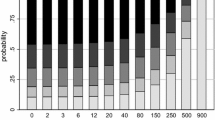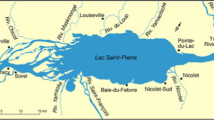Abstract
Recent moves in the European Union have beenmade towards a toughening of legislation onbathing water quality. This has focussedpolicy-makers thoughts on the welfare benefitsresulting from such improvements, especiallygiven their cost. Our paper uses a combinedstated and revealed preference approach tovalue coastal water quality improvements,focussing on an area of Scotland which hasconsistently failed to meet standards under theBathing Waters Directive. We combine data onreal behaviour with data on contingentbehaviour using a random effects negativebinomial panel model. This allows us to predictboth the change in participation (trips) shouldwater quality be improved, and the welfareincrease per trip. Our model includes allowancefor the existence of substitute sites, and forchanges in recreational behaviour during abeach visit.
Similar content being viewed by others
References
Adamowicz, W., J. Swait, P. Boxall, J. Louviere and M. Williams (1997), 'Perceptions Versus Objective Measures of Environmental Quality in Combined Revealed and Stated Preference Models of Environmental Valuation', Journal of Environmental Economics and Management 32(1), 52-64.
Ben-Akiva, M. and T. Morikawa (1990), 'Estimating Switching Models from Revealed Preferences and Stated Intentions', Transportation Research A 24, 485-495.
Bockstael, N., W.M. Hanemann and I. Strand (1984), Measuring the Benefits of Water Quality Improvements using Recreational Demand Models. Environmental Protection Agency, Washington, D.C.
Countryside Recreation Network (1996), UK Day Visits Survey, 1994. CRN, Department of City & Regional Planning, University of Wales, Cardiff.
Eisworth, M., J. Englin, E. Fadali and W.D. Shaw (2000), 'The Value of Water Levels in Water-based Recreation: A Pooled Revealed Preference/Contingent Behaviour Model', Water Resources Research 36(4), 1079-1086.
Englin, J. and T. Cameron (1996), 'Augmenting Travel Cost Models with Contingent Behaviour Data', Environmental and Resource Economics 7(2), 133-147.
Englin, J., D. Lambert and W.D. Shaw (1997), 'A Structural Equations Approach to Modelling Consumptive Recreation Demand', Journal of Environmental Economics and Management 33(1), 33-43.
Georgiou, S., I.H. Langford, I. Bateman and R.K. Turner (1998), 'Determinants of Individual Willingness to Pay for Reductions in Environmental Health Risks: A Case Study of Bathing Water Quality', Environment and Planning A 30, 577-594.
Georgiou et al. (2000), 'Coastal Bathing Water Health Risks: Assessing the Adequacy of Proposals to Amend the 1976 EC Directive', Risk, Decision and Policy 5, 49-68.
Grijalva, T., R. Berrens, A. Bohara and W.D. Shaw (2002), 'Testing the Validity of Contingent Behaviour Trip Responses', American Journal of Agricultural Economics, forthcoming.
Hanley, N. and B. Kristrom (2002), What's It Worth? Exploring Uncertainty Over Values using Contingent Valuation. Discussion papers in Economics no. 19/02, Economics Dept., University of Glasgow.
House of Lords (1995), Bathing Water Quality Revisited. European Communities Committee, House of Lords, HMSO, London.
Langford, I.H., S. Georgiou, R.J. Day and I.J. Bateman (1999), 'Comparing Perceptions of Risk and Quality with Willingness to Pay: A Mixed Methodological Study of Public Preferences for Reducing Health Risks from Polluted Coastal Bathing Waters', Risk, Decision and Policy 4(1), 1-20.
Langford, I., R. Day, S. Georgiou and I. Bateman (2000), A Cognitive Social Psychological Model for Predicting Individual Risk Perceptions and Preferences.Working Paper GEC 2000-09, Centre for Social and Economic Research on the Global Environment, University of East Anglia.
RAC (2000), Vehicle Running Costs. Royal Automobile Club, London (accessed via http://www.rac.co.uk).
SAS (1999), Response to OFWAT Document 'Draft Determinations for Future Water and Sewerage Charges 2000-2005' Surfers Against Sewage. St Agnes, Cornwall. Available at http://www.sas.org.uk/index.html.
Shaw, W.D. and P. Feather (1999), 'Possibilities for Including the Opportunity Costs of Time in Recreation Demand Systems', Land Economics 75, 592-602.
Wyer, M., J. Crowther, D. Kay and L. Fewtrell (1999a), Faecal Indicator Organism Sources and Budgets for the Irvine and Girvan Catchments, Ayshire. Final report to West of Scotland Water, Centre for Research into Environment and Health, July.
Wyer, M., D. Kay, J. Fleisher, R. Slamon, F. Jones, A. Godfree, G. Jackson and A. Rogers (1999b), 'An Experimental Health-related Classification for Marine Waters', Water Research 33(3), 715-722.
Author information
Authors and Affiliations
Corresponding author
Rights and permissions
About this article
Cite this article
Hanley, N., Bell, D. & Alvarez-Farizo, B. Valuing the Benefits of Coastal Water Quality Improvements Using Contingent and Real Behaviour. Environmental and Resource Economics 24, 273–285 (2003). https://doi.org/10.1023/A:1022904706306
Issue Date:
DOI: https://doi.org/10.1023/A:1022904706306




